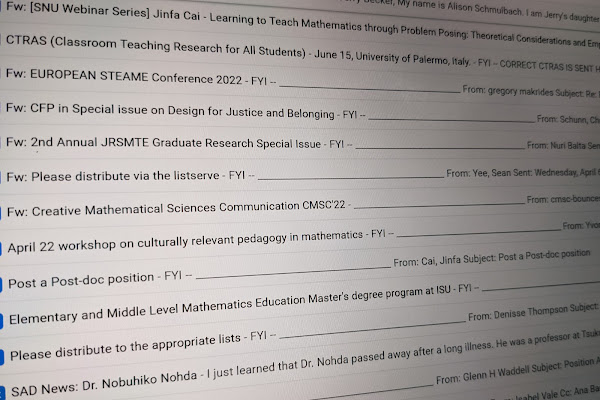 |
| Data science panel with Mahmoud Harding on the microphone |
I needed to sleep in a little and then pack my bags and check out of my hotel, so I didn't get to the convention center until the second set of sessions. I headed for a panel presentation about data science but missed the introductions. The program book said the speakers were Anna Bargagliotti, Mahmoud Harding, Hollylynne Lee, and Susan Peters, but I think that lineup might have changed. I've been in a lot of data science discussions over the past year so I'm not sure how much of this was new to me, but the Q&A revealed to me that there are a growing number of resources out there that a lot of people simply don't know about. (Note: datascience4all.org is a good place to start.) We really are still in the early stages of this, as was evidenced by one panelist explaining that he teaches in one of the largest districts in California, with 200 math teachers across 12 high schools, and he's the only one teaching a data science course.
 |
| Megan Burton |
I've never been to the AMTE conference (that's the Association for Mathematics Teacher Educators) but I occasionally attend an AMTE-focused session at the NCTM or NCSM conference. I do that partly for the information, but partly to figure out if I have a place in that organization. As a math specialist in a state department of education, part of my role involves providing professional development to teachers and I occasionally get to work with licensure and endorsement policies for teachers. But unlike most (all?) of AMTE's members, I'm not a higher education faculty member charged with the education of preservice teachers. This session, led by Megan Burton, was titled "Mentoring, Challenging, and Empowering: AMTE's Standards for Preparing Teachers of Mathematics." I think I would have liked hearing about the standards, but the first half focused on mentoring and that's not an aspect of my job and therefore wasn't as relevant to me.
I might have stayed in the AMTE session until then end, but I wanted to catch a 30-minute session called "Creating and Sustaining a Free Mathematics Conference to Empower Educators." It was led by Cody Osterhout and Paul Volkert, two educators in a New York BOCES (bureau of cooperative educational services) who creeated a math conference with very simple and humble beginnings and have grown it over the past five years. I'm fortunate that our state math conference is well-established, but I wanted that 30 minutes to look at conferences through a fresh set of eyes and to consider what's essential and what's extra as we adjust our conference to meet changing needs and varying levels of participation.
 |
| José Vilson |
I somehow made it all week without hearing about anyone who couldn't participate in the conference due to COVID, and then Eugenia Cheng, our closing speaker, had to cancel on short notice because she got COVID! I'm sure she wasn't the only one, but it was probably too much to hope for that nobody would get sick all week. So that left the program committee in a bind -- what can you do to replace a keynote speaker with about 48 hours notice? You take advantage of having José Vilson on your program committee, that's what. José's an experienced keynote speaker with experience on the big stage at NCTM, having delivered the Iris Carl address in 2019. He wasn't the most prepared, or dressed like he might have for a keynote, but he quickly put together a talk called "A Moment of Hope: Why We Do What We Do." The talked moved a bit like a series of Ignite sessions, with maybe 5-minute chapters highlighting different reasons for teaching and working with youth. Perhaps the most impactful was José's collage of photos of former students of his who have gone on to become teachers.
 |
| So long, L.A., and thanks for the bikes |
The final bit of business to conclude the 2022 Annual Meeting was for Trena Wilkerson to hand over the presidency of NCTM to Kevin Dykema. Kevin is a middle school teacher from Michigan and has long been involved as an NCTM board member and as a member of various committees. It's always nice to see a teacher lead an organization of teachers, and I have a sense that Kevin is going to do great. There will be a lot of NCTM activities in the meantime, but next year's conference is set for Washington, D.C. We were there in 2018, which really wasn't long ago, but it's a great place for the conference because the population density is high and that helps improve turnout. I like visiting D.C., and there are still a ton of museums and cultural attractions I want to see, so I'm looking forward to it already.








































